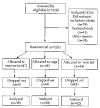Randomized, controlled, six-month trial of yoga in healthy seniors: effects on cognition and quality of life - PubMed (original) (raw)
Randomized Controlled Trial
. 2006 Jan-Feb;12(1):40-7.
Affiliations
- PMID: 16454146
- PMCID: PMC1457100
Randomized Controlled Trial
Randomized, controlled, six-month trial of yoga in healthy seniors: effects on cognition and quality of life
Barry S Oken et al. Altern Ther Health Med. 2006 Jan-Feb.
Abstract
Context: There are potential benefits of mind-body techniques on cognitive function because the techniques involve an active attentional or mindfulness component, but this has not been fully explored.
Objective: To determine the effect of yoga on cognitive function, fatigue, mood, and quality of life in seniors.
Design: Randomized, controlled trial comparing yoga, exercise, and wait-list control groups.
Participants: One hundred thirty-five generally healthy men and women aged 65-85 years.
Intervention: Participants were randomized to 6 months of Hatha yoga class, walking exercise class, or wait-list control. Subjects assigned to classes also were asked to practice at home.
Main outcome measures: Outcome assessments performed at baseline and after the 6-month period included a battery of cognitive measures focused on attention and alertness, the primary outcome measures being performance on the Stroop Test and a quantitative electroencephalogram (EEG) measure of alertness; SF-36 health-related quality of life; Profile of Mood States; Multi-Dimensional Fatigue Inventory; and physical measures related to the interventions.
Results: One hundred thirty-five subjects were recruited and randomized. Seventeen subjects did not finish the 6-month intervention. There were no effects from either of the active interventions on any of the cognitive and alertness outcome measures. The yoga intervention produced improvements in physical measures (eg, timed 1-legged standing, forward flexibility) as well as a number of quality-of-life measures related to sense of well-being and energy and fatigue compared to controls.
Conclusions: There were no relative improvements of cognitive function among healthy seniors in the yoga or exercise group compared to the wait-list control group. Those in the yoga group showed significant improvement in quality-of-life and physical measures compared to exercise and wait-list control groups.
Figures
FIGURE 1
Flow of Study Subjects From Recruitment Through Randomization and Analysis
Similar articles
- Randomized controlled trial of yoga and exercise in multiple sclerosis.
Oken BS, Kishiyama S, Zajdel D, Bourdette D, Carlsen J, Haas M, Hugos C, Kraemer DF, Lawrence J, Mass M. Oken BS, et al. Neurology. 2004 Jun 8;62(11):2058-64. doi: 10.1212/01.wnl.0000129534.88602.5c. Neurology. 2004. PMID: 15184614 Clinical Trial. - Adherence to yoga and exercise interventions in a 6-month clinical trial.
Flegal KE, Kishiyama S, Zajdel D, Haas M, Oken BS. Flegal KE, et al. BMC Complement Altern Med. 2007 Nov 9;7:37. doi: 10.1186/1472-6882-7-37. BMC Complement Altern Med. 2007. PMID: 17996075 Free PMC article. Clinical Trial. - Erratum.
[No authors listed] [No authors listed] Mult Scler. 2016 Oct;22(12):NP9-NP11. doi: 10.1177/1352458515585718. Epub 2015 Jun 3. Mult Scler. 2016. PMID: 26041800 - Exercise therapy for chronic fatigue syndrome.
Larun L, Brurberg KG, Odgaard-Jensen J, Price JR. Larun L, et al. Cochrane Database Syst Rev. 2017 Apr 25;4(4):CD003200. doi: 10.1002/14651858.CD003200.pub7. Cochrane Database Syst Rev. 2017. PMID: 28444695 Free PMC article. Updated. Review. - Exercise therapy for chronic fatigue syndrome.
Larun L, Brurberg KG, Odgaard-Jensen J, Price JR. Larun L, et al. Cochrane Database Syst Rev. 2016 Dec 20;12(12):CD003200. doi: 10.1002/14651858.CD003200.pub6. Cochrane Database Syst Rev. 2016. PMID: 27995604 Free PMC article. Updated. Review.
Cited by
- Physical and psychosocial benefits of yoga in cancer patients and survivors, a systematic review and meta-analysis of randomized controlled trials.
Buffart LM, van Uffelen JG, Riphagen II, Brug J, van Mechelen W, Brown WJ, Chinapaw MJ. Buffart LM, et al. BMC Cancer. 2012 Nov 27;12:559. doi: 10.1186/1471-2407-12-559. BMC Cancer. 2012. PMID: 23181734 Free PMC article. Review. - Musical instrumental reading affects middle cerebral blood flow and cognitive function.
Kawasaki A, Hayashi N. Kawasaki A, et al. Front Physiol. 2022 Aug 29;13:966969. doi: 10.3389/fphys.2022.966969. eCollection 2022. Front Physiol. 2022. PMID: 36105277 Free PMC article. - Quality of life (QOL), supportive care, and spirituality in hematopoietic stem cell transplant (HSCT) patients.
Sirilla J, Overcash J. Sirilla J, et al. Support Care Cancer. 2013 Apr;21(4):1137-44. doi: 10.1007/s00520-012-1637-y. Epub 2012 Oct 30. Support Care Cancer. 2013. PMID: 23108474 - Physical exercise in the prevention and treatment of Alzheimer's disease.
De la Rosa A, Olaso-Gonzalez G, Arc-Chagnaud C, Millan F, Salvador-Pascual A, García-Lucerga C, Blasco-Lafarga C, Garcia-Dominguez E, Carretero A, Correas AG, Viña J, Gomez-Cabrera MC. De la Rosa A, et al. J Sport Health Sci. 2020 Sep;9(5):394-404. doi: 10.1016/j.jshs.2020.01.004. Epub 2020 Feb 4. J Sport Health Sci. 2020. PMID: 32780691 Free PMC article. Review. - Biofield Frequency Bands-Definitions and Group Differences.
Rowold J, Hewson PD. Rowold J, et al. Glob Adv Health Med. 2020 Dec 24;9:2164956120982568. doi: 10.1177/2164956120982568. eCollection 2020. Glob Adv Health Med. 2020. PMID: 35392431 Free PMC article.
References
- Saper RB, Eisenberg DM, Davis RB, Culpepper L, Phillips RS. Prevalence and patterns of adult yoga use in the United States: results of a national survey. Altern Ther Health Med. 2004;10:44–49. - PubMed
- Barnes PM, Powell-Griner E, McFann K, Nahin RL. Complementary and alternative medicine use among adults: United States, 2002. CDC Ad Data. 2004;(343) May 27, 2004:1–19. - PubMed
- Berger BG, Owen DR. Mood alteration with yoga and swimming: aerobic exercise may not be necessary. Percept Mot Skills. 1992;75(3 Pt 2):1331–1343. - PubMed
- Berger BG, Owen DR. Stress reduction and mood enhancement in four exercise modes: swimming, body conditioning, Hatha yoga, and fencing. Res Q Exerc Sport. 1988;59(2):148–159.
- Feuerstein G. Traditional definitions of yoga. Yoga Research and Education Center website. Available at: http://www.yrec.info/contentid-l7.html Accessed November 29, 2005.
Publication types
MeSH terms
Grants and funding
- K01 AT000066/AT/NCCIH NIH HHS/United States
- M01 RR000334/RR/NCRR NIH HHS/United States
- 5 M01 RR00034/RR/NCRR NIH HHS/United States
- AT-00066/AT/NCCIH NIH HHS/United States
- P50 AT000066/AT/NCCIH NIH HHS/United States
LinkOut - more resources
Full Text Sources
Medical
